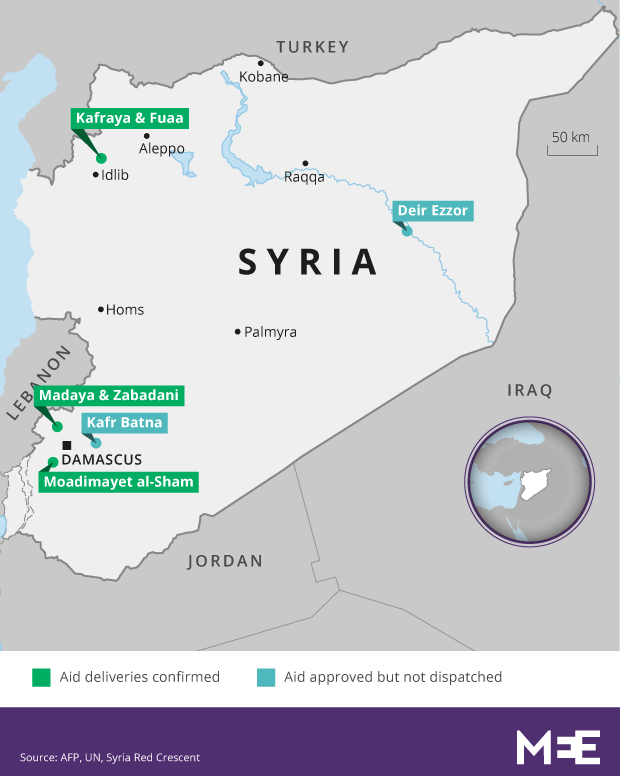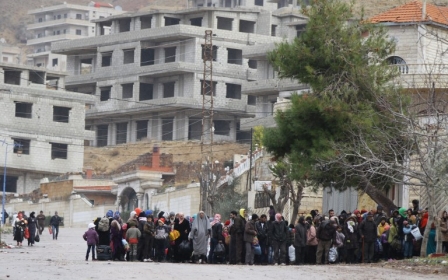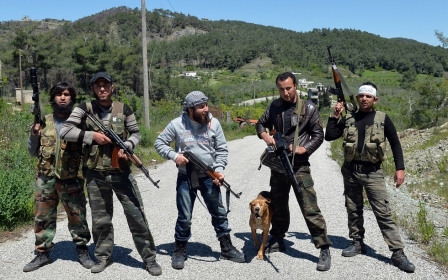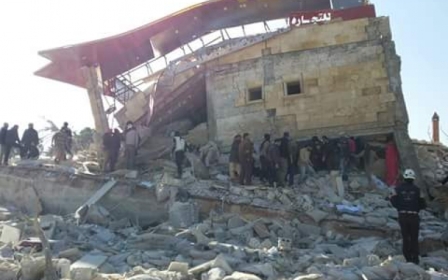Aid arrives in besieged Syrian town as ceasefire hangs in balance
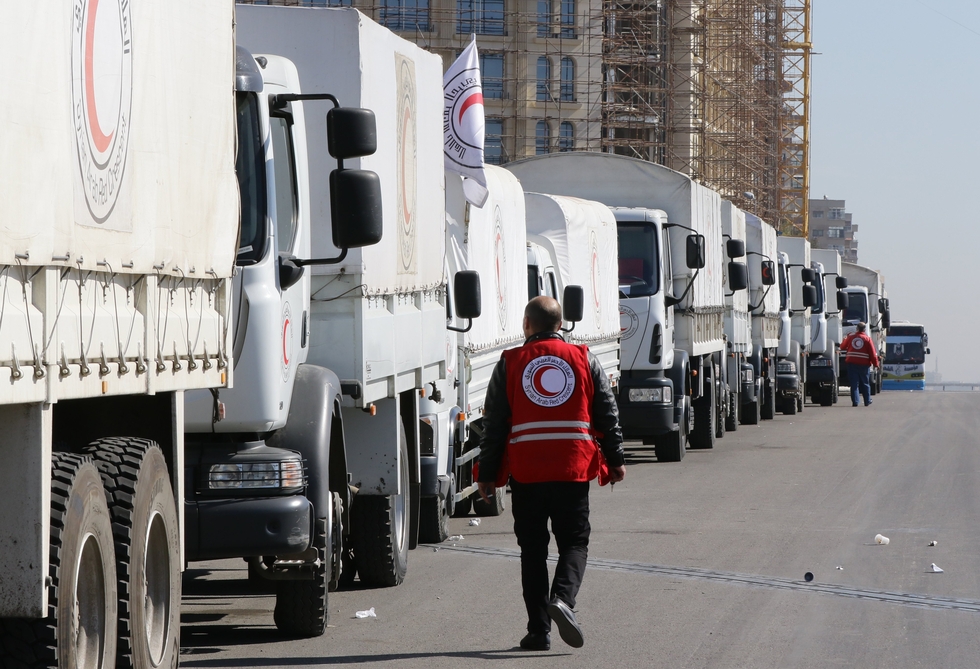
UN convoys set out on Wednesday on a mission to deliver aid to thousands of besieged Syrians.
35 trucks carrying humanitarian aid arrived at the southern town of Muadamiyat al-Sham on Wednesday afternoon, the Syrian state news agency said.
Muadamiyat al-Sham is under rebel control, but besieged by forces supporting the Syrian government.
Syria's government had approved access to seven besieged areas, including the city of Madaya, where dozens of people are thought to have died from starvation, a spokesperson for the UN humanitarian affairs office said.
Speaking in Damascus, UN envoy Staffan de Mistura confirmed that aid convoys would be sent on Wednesday, in what was understood as a test of whether the warring parties would allow in humanitarian supplies.
"It is the duty of the government of Syria to want to reach every Syrian person wherever they are and allow the UN to bring humanitarian aid," he said after meeting Syria's Foreign Minister Walid Muallem.
"Tomorrow we test this," he said on Tuesday.
The Syrian Red Crescent said on Wednesday morning that 100 trucks carrying flour, other food supplies and medicines were preparing to set out for five of the besieged areas.
As well as the 35 trucks that reached Muadamiyat al-Sham, 35 vehicles were to travel to Madaya and Zabadani, two other regime-besieged towns near Damascus, and 29 were to go to Fuaa and Kafraya, two Shiite towns in northwestern Idlib province besieged by rebels, he said.
Almost half a million people in Syria are in areas under siege, according to the UN, after nearly five years of civil war between Syria's government and rebel forces.
A Red Crescent source said the first convoys would head for the rebel-besieged Shia-majority villages of Fuaa and Kafraya in the north, and to Madaya and Zabadani, which are encircled by the army.
Allowing in humanitarian aid has been an important element in negotiations to clinch a ceasefire across war-torn Syria, but both sides have cast doubt on whether it will be implemented.
During crunch talks held in Munich last Thursday, 17 countries involved in the conflict agreed to a nationwide "cessation of hostilities" across Syria within a week.
But since then the bombings of at least five medical facilities and two schools in northern Syria, which the UN said Monday killed 50 people including children, have dimmed hopes for a ceasefire.
Under the deal, a new round of peace talks will be held in Geneva on 25 February.
Ceasefire hanging in balance
"I can't say categorically that a week from last Thursday there must be a cessation of hostilities," deputy State Department spokesman Mark Toner told reporters in Washington on Tuesday.
"I'm not trying to excuse the delay in any way, shape or form. I think we're going to continue to pursue, aggressively, the cessation of hostilities."
Syria's envoy to the UN, Bashar Jaafari, also warned on Tuesday that "a ceasefire would take much longer than a week".
The school and hospital bombings took place around Syria's second city of Aleppo, where the government has been pressing a major offensive against the rebels backed by Russian air strikes.
Neither the UN nor the US have directly accused Moscow of carrying out those strikes, but the State Department said Monday that the attacks cast doubt on Russia's willingness or ability to stop the fighting.
US President Barack Obama said the ceasefire would be difficult to achieve while Russia's bombing campaign continues.
"If Russia continues indiscriminate bombing of the sort that we've been seeing, I think it's fair to say that you're not gonna see any take-up by the opposition," he said Tuesday.
Russia denied it had bombed any hospital, calling such reports "unsubstantiated accusations".
Turkey, however, has branded Russia's air war in support of Assad "barbaric," and is now pushing to send in troops to Syria with the help of the US and the Gulf states.
"We want a ground operation with our international allies," a senior Turkish official told reporters in Istanbul.
"There is not going to be a unilateral military operation from Turkey to Syria," the official emphasised, but added: "Without a ground operation it is impossible to stop the fighting in Syria."
Russia slams 'total violations' by Turkey
Turkey has also been locked in its own war in the north of Syria with Kurdish rebels, who it believes are allied to the outlawed Kurdistan Workers' Party (PKK) that has waged an insurgency in Turkey for decades.
It fears the fighting in Syria will allow the Kurds there to create their own territory just across the border from Turkey.
On Tuesday, Turkey shelled Kurdish positions in northern Syria for a fourth straight day, the Syrian Observatory for Human Rights monitoring group said.
Turkish Prime Minister Ahmet Davutoglu accused Kurdish fighters in Syria of being "Russia's legion working as mercenaries" and harming Turkey's interests.
"Those vile, cruel and barbaric planes have made close to 8,000 sorties since 30 September without any discrimination between civilians and soldiers, or children and the elderly," he said.
Russia hit back on Wednesday morning, with the foreign ministry describing the Turkish strikes as "a total violation of law".
The UN had previously criticised the strikes on Tuesday after talks requested by Russia, in a decision hailed by Syria's envoy.
Venezuelan Ambassador Rafael Ramirez told reporters the 15 council members "expressed concern about the Turkish attacks in northern Syria" and will "ask Turkey to comply with international law".
New MEE newsletter: Jerusalem Dispatch
Sign up to get the latest insights and analysis on Israel-Palestine, alongside Turkey Unpacked and other MEE newsletters
Middle East Eye delivers independent and unrivalled coverage and analysis of the Middle East, North Africa and beyond. To learn more about republishing this content and the associated fees, please fill out this form. More about MEE can be found here.


